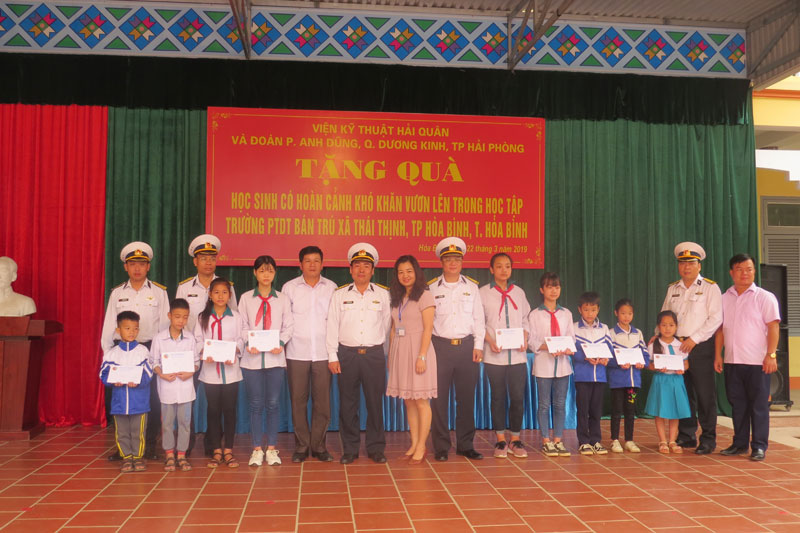
(HBO) - The Naval Technical Institute and the Hoa Binh provincial Party Committee's Commission for Education and Information have played a consultation role in helping implement a programme on coordinating sea and island communications work signed by the Party Committee of the Navy and the Hoa Binh provincial Party Committee. After nearly one year, their join work has strengthened a diverse coordination among the local authorities, the Fatherland Front, the political and social organisations and people.
 Representative of the
Naval Technical Institute presents gifts to disadvantaged students at the
boarding high school for ethnic minority people in Thai Thinh commune (Hoa Binh
city).
Representative of the
Naval Technical Institute presents gifts to disadvantaged students at the
boarding high school for ethnic minority people in Thai Thinh commune (Hoa Binh
city).
Based on 10 cooperation areas of the programme, right in the
first year of its implementation, the institute designed an action plan
suitable to the local conditions. Its communication work has so far reached 1,500
Party delegates via a conference of local rapporteurs; and 2,160 teachers and
students in a bid to attract human resources to develop the Navy.
Meanwhile, a series of practical movements and activities
have been held, including a campaign themed "the entire country for Truong
Sa" and the organisation of trips for dozens of Hoa Binh representatives
to visit and present gifts to soldiers and people in Truong Sa island district.
These activities have contributed to raising local
officials’ and people’s awareness on the role and importance of the sea and islands,
the history and legal basis affirming Vietnam's sovereignty over its sea and
islands; and work of the Vietnamese People's Navy to safeguard the sovereignty./.
The Standing Board of the Hoa Binh provincial Party Committee has agreed in principle on a proposal by the Standing Board of the Party Committee of Hoa Binh city to gather feedback on the city’s 1:2000 zoning plan, which forms part of its broader urban development strategy.
Hoa Binh province has made notable progress in public administration reform and digital government development, with the satisfaction index among citizens and businesses reaching over 84%, according to recent government evaluations.
Thanks to great efforts by local authorities in recent times, the governance and public administration performance of Mai Chau district has been significantly improved.
In the afternoon of June 6, the Party Committee, the People's Council, the People's Committee and the Fatherland Front of Lac Son district solemnly held a meeting to celebrate the 139th anniversary of the district's founding (1886–2025) and the 79th anniversary of the establishment of the district's Party Committee (1946–2025). There was the attendance of Mr. Bui Van Thang, the Vice Chairman of the Provincial People's Council; Mr. Quach Tat Liem, the Vice Chairman of the Provincial People's Committee; Ms. Dang Bich Ngoc, the Deputy Head of the National Assembly Delegation of the province; as well as the former leaders of the province and district through various periods, who are the natives of the district.
Implementing the Politburo’s Resolution No. 57-NQ/TW on breakthroughs in science – technology, innovation, and digital transformation is a golden opportunity for the northern mountainous province of Hoa Binh to renew growth model, improve competitive edge and shorten digital gap.
Resolution 57-NQ/TW, issued by the Politburo on December 22, 2024, identifies sci-tech, innovation, and digital transformation as strategic breakthroughs to build a developed and prosperous nation. In Hoa Binh province, this spirit is not just a slogan, it’s being put into action through concrete initiatives that form a "new development triangle”: digital citizenship, digital economy, and digital administration.



 Representative of the
Naval Technical Institute presents gifts to disadvantaged students at the
boarding high school for ethnic minority people in Thai Thinh commune (Hoa Binh
city).
Representative of the
Naval Technical Institute presents gifts to disadvantaged students at the
boarding high school for ethnic minority people in Thai Thinh commune (Hoa Binh
city).